Interview with Nigerian Writer, Akachi Adimora-Ezeigbo
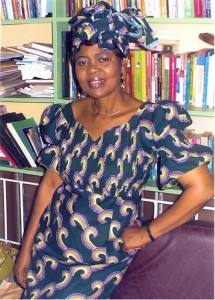 Akachi Adimora-Ezeigbo was born and raised in Eastern Nigeria, but now lives in Lagos. Raised partially in a rural environment and partially in the city, she combines these two factors, as background and setting for her children’s stories and adult fiction.
Akachi Adimora-Ezeigbo was born and raised in Eastern Nigeria, but now lives in Lagos. Raised partially in a rural environment and partially in the city, she combines these two factors, as background and setting for her children’s stories and adult fiction.
Akachi obtained her Bachelor of Arts (BA) and Masters (MA) degrees in English from the University of Lagos and her Ph. D from University of Ibadan, in Nigeria. A lecturer, writer, novelist, critic, essayist, journalist, and administrator, she was appointed a professor of English at University of Lagos in 1999. She has taught in this university, in the Department of English, since 1981. She has travelled extensively in Africa, Europe and in the USA. She is married to Professor Chris Ezeigbo and they have three children.
Geoffrey Kwadwo Gyasi: You were nominated the ‘Most Admired Lecturer’ by final year students of the English Department in 2009/10 at the University of Lagos. Tell me, what kind of Lecturer are you?
Akachi Adimora-Ezeigbo: This question should be answered by the students I teach. However, I’d like to say that as a trained teacher (with a postgraduate diploma in education) I try to do my work well. I believe I am a good and effective lecturer who attends classes regularly. I relate well to students and pay them as much attention as I can, especially the students I supervise their projects, dissertations and theses. My relationship with students goes beyond the classroom, for I have been a patron in many student organizations (Anglican Students Association; English Students Association; The Weavers Creative Writing Club etc) and Hall Mistress to at least four halls of residence at the University of Lagos at different times. I love my job and devote time to do it to the best of my ability.
Geoffrey Kwadwo Gyasi: You seem to have been in the teaching field for a long while; teaching in Secondary schools, Teachers college and the University. Have you always wanted to be a teacher?
Akachi Adimora-Ezeigbo: Initially I wanted to be a journalist, but then I got married as a second year undergraduate (early in my career, you might say) and decided that teaching would be the best profession for me, especially as my husband (a postgraduate student) was soon to become a practising surveyor and would be moving from one part of Nigeria to another in the course of his duty. I wanted to be with him all the time and it would be easier for me to ask for a transfer as a teacher. I started my national service (NYSC) in Jos and later asked to be posted to Makurdi for my primary assignment to be with my husband. He was then with Federal Surveys. When he was transferred further north, I had to go with him to Gusau and Kaduna before returning to Lagos where we started our life together. In that period, I had taught English language at Government Technical Training College Makurdi; Federal Government Teachers’ College, Makurdi; Federal Government Girls’ Secondary School, Bakori and Federal Government College, Kaduna. You see, when my husband decided to go back to academics three years later, I contacted my former department at the University of Lagos (which had actually wanted to retain me after my graduation) and was immediately offered appointment as a Graduate Assistant. I grabbed the opportunity. Then, both of us began to teach at the University of Lagos.
Geoffrey Kwadwo Gyasi: How do you reconcile the two professions – teaching and writing?
Akachi Adimora-Ezeigbo: For me writing and teaching are symbiotic. I have carried both professions along and they have blended so well. As an academic, I do a lot of research and have published locally and internationally. I am also a creative writer and derive so much satisfaction from both.
Geoffrey Kwadwo Gyasi: You worked for some newspapers in Lagos – The Independent and the Post Express. How is the physical act of writing for newspapers different from writing fiction?
Akachi Adimora-Ezeigbo: It was easy for me to get on with the two activities which I believe reinforced and invigorated each other. However, they are different in the sense that one – writing for newspaper – meant one using a lot of topical issues as source material. For instance, the one or two editorials I had to write weekly dealt with topical issues being happening or being discussed inside and outside Nigeria. Such topical issues could be about politics, sports, culture, education, the economy or religion. The editorial board would raise an issue, discuss it and then the editorial was assigned to a member of the board who would write it and submit. One was expected to meet the deadline. There were always deadlines for editorials and other articles. I guess it’s always the case with newspapers or the print media generally. Writing for newspapers, I was always under pressure to meet deadlines. I wrote regularly; it was so disciplining. I wrote my weekly column on Sunday mornings before going to church. I would wake up early and write it. As for the editorial, I wrote it as soon as I could after the meeting of the editorial board. Sometimes, the editorial was needed the very next day, and you had to write it. But fiction is different; I work at my own pace. I’m not under pressure, even when it is commissioned by my regular publisher or any other publisher for that matter. Sometimes it takes me long to complete a manuscript. Besides, I may choose to write about a subject that happened decades ago, as I did in my historical novel, The Last of the Strong Ones, the first of my Umuga trilogy. Or I may choose to write about something very contemporary as I did in the novel, Trafficked, based on human trafficking which is a current scourge in our society. I wrote about the Nigerian Civil War which was fought between 1967 and 1970 in my novel, Roses and Bullets.
Geoffrey Kwadwo Gyasi: How did you get started with writing?
Akachi Adimora-Ezeigbo: I began writing early, actually in secondary school. I was the president of the dramatic society of my school in Port Harcourt and wrote a play for the society to stage. I also sketched another play which was a dramatization of the founding of our school, Archdeacon Crowther Memorial Girls’ School (ACMGS) by the Church Missionary Society (CMS) in Elelenwa, near Port Harcourt. I continued writing as an undergraduate at the University of Lagos where I was a member of the editorial board of the English Department’s students’ journal. I published poems and short stories in the journal.
Geoffrey Kwadwo Gyasi: How does writing for children or young adults differ from writing for adults?
Akachi Adimora-Ezeigbo: I began writing for children when Heinemann (UK) commissioned me to write books for children in their Junior African Writers Series (JAWS). I have two titles with them and they have been translated into two African languages – Swahili and Xhosa. Pearson is in charge now. Writing for children is different from writing for adults. When you write for children, you are conscious of vocabulary control, and the use of dialogue which must be natural and, of course, illustrations. I like to make suggestions to my publishers when it comes to the question of illustrations. I am also very careful in my choice of words (the level of language use) when I write my children’s books. It depends on the level I am writing for at a particular time, whether for children aged five or seven or eleven. All these will affect what I write and how I write it. It takes me a shorter period to write a children’s book than an adult’s. And I have written 21 books for children.
Geoffrey Kwadwo Gyasi: Not too long ago, the funeral service for Chinua Achebe was held; of which you attended. If I may ask, what would you remember Achebe for?
Akachi Adimora-Ezeigbo: No matter what anyone says, I regard Achebe as the father of ‘modern African literature’ – what some people refer to as ‘postcolonial African literature’. The prestige African literature enjoys globally today is a result of the ground-breaking work done by Achebe (especially with his Things Fall Apart) and a few other writers like him. I will always remember him as a man of courage and integrity; a great patriot and lover of his people. I remember him with gratitude for being the founder of the Association of Nigerian Authors (ANA), an organization I am very proud of.
Geoffrey Kwadwo Gyasi: You’ve received a large number of literary awards as a writer. Is there any special one which you feel so privileged to have won?
Akachi Adimora-Ezeigbo: I feel privileged to have won The Nigeria Prize for Literature (with My Cousin Sammy) and the Cadbury/ANA Prize for Poetry (with Heart Songs).
Geoffrey Kwadwo Gyasi: You are the first Vice-President of Women Writers Association of Nigeria. What is your assessment of the growth in number and quality of literatures from women writers in Nigeria?
Akachi Adimora-Ezeigbo: Nigerian women writers – at home and in the Diaspora – have brought honour and prestige to Nigeria by the quality of their writing. It’s amazing the number of women who are writing and writing well. It makes me feel so good. The distinguished writer and Nobel Laureate, Wole Soyinka, pointed this out when he said at a public function: “The women are coming.” I don’t want to mention names because there are so many of them: women who have stormed the literary arena with a bang! This is just the beginning. More are coming. I disagree with those (for example, Ikhide in his recent review of Adichie’s latest novel) who say women are deflating male characters and inflating women characters. What women writers have done and are doing is to show characters – male and female – as they truly are by exposing their foibles and weaknesses. It is not a drive to ridicule a particular sex. Some male writers have done this in the past. A classic example of this form of character portrayal in fiction is seen in Ayi Kwe Armah’s four novels, The Beautyful Ones Are Not Yet Born, Fragment, The Healers and Two Thousand Seasons where reprehensible, obnoxious and evil characters are symbolically portrayed through the highlighting of their physical, spiritual and mental deformities. Consider, for instance, characters like Koomson, Araba, Ababio, Buntui and Koranchi
Geoffrey Kwadwo Gyasi: Among all the books you’ve written, which one do you consider your favorite?
Akachi Adimora-Ezeigbo: I don’t really have a favorite. I like all of them. I tell you, once I complete a book and it is published, my attention is withdrawn from it and focused on the next book. The other day, on 6th July, I was interacting with pupils of Scholar Crest International School in Lagos who have read practically all of my books for children. The pupils read their reviews of my books and I was surprised at the details about the books that I had long forgotten. And here were the children reminding me of ideas and characters I’d long forgotten. Yes, I have no favorite, but the books are all mine and I cherish them.
Geoffrey Kwadwo Gyasi: What legacy would you love to leave behind as a writer? Is there any special book you feel you’ve not yet written?
Akachi Adimora-Ezeigbo: A legacy of a garnering a large reading public. My books and the books of other writers need more and more readers, just as it was when we were in school long ago and people were reading books all over the country. It’s enough for me that my books are being read and studied by students in this and other countries. I hope to write more books. Right now I’m writing a book in Igbo language; I’ve wanted to do this for a long time.
Interviewer
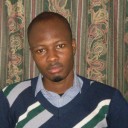 Geoffrey Kwadwo Gyasi is a Ghanaian bookblogger, writer, reader and interviewer. He blogs at Geosi Reads: A World of Literary Pieces.
Geoffrey Kwadwo Gyasi is a Ghanaian bookblogger, writer, reader and interviewer. He blogs at Geosi Reads: A World of Literary Pieces.
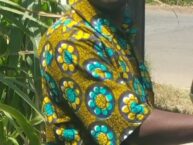
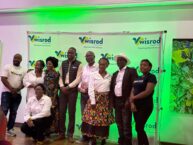
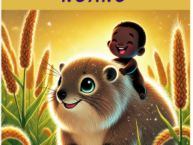
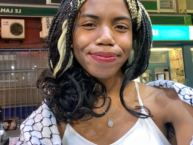
1 comment for “Geoffrey Gyasi”